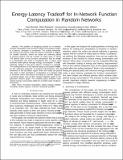Energy-latency tradeoff for in-network function computation in random networks
Author(s)
Balister, Paul; Bollobas, Bela; Anandkumar, Animashree; Willsky, Alan S.
DownloadWillsky_Energy-latency tradeoff.pdf (185.5Kb)
OPEN_ACCESS_POLICY
Open Access Policy
Creative Commons Attribution-Noncommercial-Share Alike
Terms of use
Metadata
Show full item recordAbstract
The problem of designing policies for in-network function computation with minimum energy consumption subject to a latency constraint is considered. The scaling behavior of the energy consumption under the latency constraint is analyzed for random networks, where the nodes are uniformly placed in growing regions and the number of nodes goes to infinity. The special case of sum function computation and its delivery to a designated root node is considered first. A policy which achieves order-optimal average energy consumption in random networks subject to the given latency constraint is proposed. The scaling behavior of the optimal energy consumption depends on the path-loss exponent of wireless transmissions and the dimension of the Euclidean region where the nodes are placed. The policy is then extended to computation of a general class of functions which decompose according to maximal cliques of a proximity graph such as the k-nearest neighbor graph or the geometric random graph. The modified policy achieves order-optimal energy consumption albeit for a limited range of latency constraints.
Date issued
2011-06Department
Massachusetts Institute of Technology. Department of Electrical Engineering and Computer Science; Massachusetts Institute of Technology. Laboratory for Information and Decision SystemsJournal
Proceedings of the IEEE INFOCOM, 2011
Publisher
Institute of Electrical and Electronics Engineers (IEEE)
Citation
Balister, Paul et al. “Energy-latency Tradeoff for In-network Function Computation in Random Networks.” Proceedings of the IEEE INFOCOM, 2011. 1575–1583.
Version: Author's final manuscript
ISBN
978-1-4244-9919-9
ISSN
0743-166X